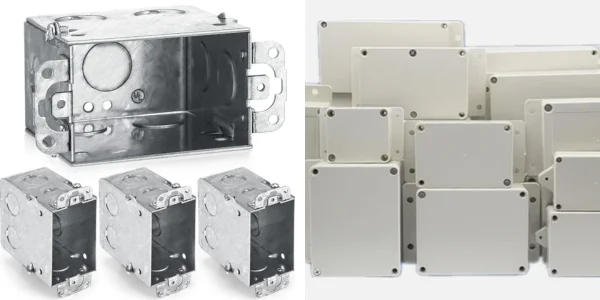When it comes to electrical installations, choosing between a metal electrical box and a plastic electrical box is an important decision that can impact safety, durability, and installation ease. Both options have their advantages and drawbacks, so selecting the right one depends on your project requirements, budget, and environment.
In this article, we’ll compare metal and plastic electrical boxes in terms of durability, safety, cost, and installation to help you make an informed choice.
What is an Electrical Box?
An electrical box is an enclosure that houses electrical wiring connections, outlets, switches, and fixtures. It acts as a protective barrier to prevent electrical fires, shocks, and damage.
Electrical boxes are commonly made from metal (steel or aluminum) or plastic (PVC or polycarbonate), and each has distinct benefits.
Key Differences Between Metal and Plastic Electrical Boxes

a) Durability and Strength
- Metal Electrical Boxes: Known for their superior strength and durability, metal boxes resist impact, making them ideal for high-traffic areas or industrial settings.
- Plastic Electrical Boxes: While durable for residential use, plastic boxes are more prone to cracking or breaking under heavy stress.
✅ Winner: Metal for better strength and durability.
b) Safety and Fire Resistance
- Metal Electrical Boxes: Being non-combustible, metal boxes provide enhanced fire resistance. They also offer better grounding capabilities, reducing the risk of electrical shock.
- Plastic Electrical Boxes: Although plastic boxes are designed to resist fire, they are still combustible and can melt under extreme heat.
✅ Winner: Metal for superior fire resistance and safety.
c) Conductivity and Grounding
- Metal Electrical Boxes: Since metal is conductive, these boxes must be properly grounded to prevent electrical shocks. However, this built-in conductivity can act as an added layer of protection if wiring faults occur.
- Plastic Electrical Boxes: Being non-conductive, plastic boxes don’t require grounding, simplifying the installation process.
✅ Winner: Plastic for easier installation in non-grounded setups.
d) Corrosion Resistance
- Metal Electrical Boxes: Prone to rust and corrosion in damp environments unless treated with protective coatings.
- Plastic Electrical Boxes: Completely resistant to corrosion, making them ideal for outdoor or damp environments.
✅ Winner: Plastic for better corrosion resistance.
e) Installation Process
- Metal Electrical Boxes: Require grounding and may need extra tools like metal clamps for securing wires. They are generally heavier and more complex to install.
- Plastic Electrical Boxes: Lightweight and easier to cut or modify during installation. Most plastic boxes feature built-in mounting tabs for convenience.
✅ Winner: Plastic for easier installation.
f) Cost
- Metal Electrical Boxes: Typically more expensive due to their sturdy construction and fire resistance.
- Plastic Electrical Boxes: Generally cheaper, making them a budget-friendly option for basic home installations.
✅ Winner: Plastic for affordability.
g) Environmental Suitability
- Metal Electrical Boxes: Ideal for exposed wiring, industrial areas, or places where extra durability is needed.
- Plastic Electrical Boxes: Best suited for indoor residential use or damp locations like bathrooms or basements.
✅ Winner: Depends on the environment — metal for demanding areas, plastic for general home use.
Pros and Cons of Metal Electrical Boxes
Pros
✅ Highly durable and impact-resistant
✅ Superior fire resistance
✅ Offers better grounding protection
✅ Ideal for industrial and high-traffic areas
Cons
❌ Heavier and more challenging to install
❌ Requires proper grounding
❌ Prone to corrosion in humid environments (unless coated)
❌ Typically more expensive
Pros and Cons of Plastic Electrical Boxes
Pros
✅ Lightweight and easy to install
✅ Non-conductive (no grounding required)
✅ Corrosion-resistant — ideal for damp or outdoor spaces
✅ More affordable than metal boxes
Cons
❌ Less durable; prone to cracking under pressure
❌ Can melt in extreme heat
❌ May not meet certain building codes for commercial or industrial spaces
Which Option is Better for Different Applications?
Choose a Metal Electrical Box If:
✔️ Your installation is in a garage, workshop, or industrial space
✔️ The wiring is exposed or requires additional protection
✔️ You need enhanced fire safety features
Choose a Plastic Electrical Box If:
✔️ You’re working on a residential project with concealed wiring
✔️ Your installation is in a damp environment like a bathroom or outdoor patio
✔️ You prefer a lighter, easier-to-install option
Cost Comparison: Metal vs Plastic Electrical Boxes
| Feature | Metal Electrical Box | Plastic Electrical Box |
|---|---|---|
| Average Cost | $3 – $10 per box | $1 – $5 per box |
| Durability | Excellent | Moderate (Prone to cracks) |
| Fire Resistance | Excellent (Non-combustible) | Moderate (Can melt) |
| Grounding Required | Yes | No |
| Corrosion Resistance | Moderate (May rust) | Excellent (Won’t corrode) |
| Installation Ease | More complex | Easier |
Building Code Considerations
In the USA, building codes may specify when to use metal or plastic boxes:
- Metal boxes are often required in commercial buildings, industrial settings, or where fire resistance is crucial.
- Plastic boxes are common in residential applications and may be preferred in non-grounded systems.
Always check your local building codes before making a final choice.
Final Verdict: Which One is Better?
The right choice depends on your project’s needs:
- Plastic electrical boxes are ideal for homeowners, DIY projects, and indoor residential spaces. They offer a cost-effective and corrosion-resistant solution.
- Metal electrical boxes are better suited for commercial, industrial, or exposed wiring installations where durability and fire safety are key concerns.
For most indoor residential projects, plastic boxes are sufficient. However, if you prioritize strength, fire resistance, or commercial-grade durability, metal boxes are the better investment.
Expert Tip for Homeowners
If you’re unsure which electrical box type is best for your project, consult a licensed electrician. They can assess your wiring needs, recommend the ideal material, and ensure your installation meets local safety codes.
By selecting the right electrical box, you can enhance your home’s electrical safety and ensure a long-lasting, secure wiring system.